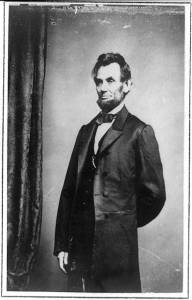150 years ago this month voters in Maryland narrowly approved a new state constitution that outlawed slavery. The votes of Maryland soldiers serving in the Union army proved to be decisive.
President Lincoln probably was pleased with the Maryland vote since he believed that if slavery wasn’t wrong nothing was wrong. 150 years ago he congratulated serenading Marylanders in D.C. about their constitution but then went on to reassure citizens that if he lost the November election he wasn’t going to try to ruin the Government or let General McClellan take control at once. President Lincoln was going to follow the Constitution. He sort of pictured himself as a competent helmsman ready to transfer the ship of state to the next duly elected president.
From The Papers And Writings Of Abraham Lincoln, Volume Seven:
RESPONSE TO A SERENADE,
OCTOBER 19, 1864.
FRIENDS AND FELLOW-CITIZENS:—I am notified that this is a compliment paid me by the loyal Marylanders resident in this District. I infer that the adoption of the new constitution for the State furnishes the occasion, and that in your view the extirpation of slavery constitutes the chief merit of the new constitution. Most heartily do I congratulate you, and Maryland, and the nation, and the world, upon this event. I regret that it did not occur two years sooner, which, I am sure, would have saved the nation more money than would have met all the private loss incident to the measure; but it has come at last, and I sincerely hope its friends may fully realize all their anticipations of good from it, and that its opponents may by its effects be agreeably and profitably disappointed.
A word upon another subject. Something said by the Secretary of State in his recent speech at Auburn, has been construed by some into a threat, that if I shall be beaten at the election, I will, between then and the end of my constitutional term, do what I may be able to ruin the Government.
Others regard the fact that the Chicago Convention adjourned, not sine die, but to meet again, if called to do so by a particular individual, as the intimation of a purpose that if their nominee shall be elected he will at once seize control of the Government. I hope the good people will permit themselves to suffer no uneasiness on either point. I am struggling to maintain the Government, not to overthrow it. I am struggling especially to prevent others from overthrowing it. I therefore say, that if I live, I shall remain President until the 4th of next March, and that whoever shall be constitutionally elected, in November, shall be duly installed as President on the 4th of March, and in the interval I shall do my utmost that whoever is to hold the helm for the next voyage shall start with the best possible chance of saving the ship. This is due to the people, both on principle and under the Constitution. Their will, constitutionally expressed, is the ultimate law for all. If they should deliberately resolve to have immediate peace, even at the loss of their country and their liberties, I know not the power or the right to resist them. It is their own business, and they must do as they please with their own. I believe, however, they are still resolved to preserve their country and their liberties; and in this, in office or out of it, I am resolved to stand by them. I may add, that in this purpose to save the country and its liberties, no classes of people seem so nearly unanimous as the soldiers in the field and the sailors afloat. Do they not have the hardest of it? Who should quail while they do not? God bless the soldiers and seamen, with all their brave commanders.
The President did not have been concerned about the November result, according to the Richmond Dispatch, which called the presidential contest for Mr. Lincoln 150 years ago today based on the outcome of state elections in Pennsylvania, Ohio, and Indiana. From the Richmond Daily Dispatch October 18, 1864:
Tuesday morning…October 18, 1864.
The completion of the return from the North leave no doubt with regard to the re-election of Lincoln. For our own part, we are in no way disconcerted or disappointed, for we have never, for one moment, entertained a doubt that the result would be precisely such as it is new evident to all that it must be. Nor, to speak the truth, are we displeased with the issue. We have always regarded McClellan as the most dangerous man for the Confederacy that could possibly have been put in nomination for the Northern Presidency; nor do we see any reason new to doubt that our opinion was well founded. He has proclaimed himself a war candidate, although placed by his friends upon a peace platform.–He avows, at the risk of losing many votes, his determination to prosecute the war to the restoration of the Union. He avows his determination, if elected, to place the prosecution of hostilities upon a footing consistent with the usages of civilized nations. Had he been elected, there is every probability that the policy of armistices and peace conventions — the most dangerous policy that could possibly have been inaugurated for our cause — would have been pushed to consummation. Besides all this, he is a man of large military experience, and knows far better than Lincoln how to handle the immense forces placed at the command of a President of the United States. We are gratified, then, at the escape we think we have made. It might have been infinitely worse. We are, indeed, confident that it would have been.
We now are pretty sure of what we have to expect. Not only is Abraham Lincoln President of the United States for the next four years after the 4th of March, 1865, but he goes in with a majority large enough to sustain him in any atrocity he may meditate. The majority of the North have pretty clearly declared themselves well pleased with the war and with the manner of conducting it. They endorse all the atrocities of Sherman, all the cruelties of Hunter, all the crimes of Sheridan, all the murders of Butler, all the butchery and barbarism of Grant. The conflagrations of our towns and villages, the deportation of our women and children, the starvation of whole populations, the instigations of our slaves to murder and robbery, an aggravation of all the horrors of war, in its most horrible aspects, where the passions are left entirely without control, and every appliance is used to stimulate them, until, by their indulgence, men become devils — all these things, the virtuous, intelligent, civilized, christian, religious North–the heirs of the best government the sun ever shone upon — have deliberately approved of as applied to us. And we accept the application. Indeed, there is no way of escape, did we even desire to avoid the issue. There can be no shuffling in the ranks now. Every man must know his place, and must keep it. The issue is not peace or war, but freedom or slavery, existence or extermination.
It is best for the people of the Confederacy to understand, once for all, that their hopes consist in their arms alone. …
Did General McClellan already have a chance to command the immense U.S. forces?
The Old Line State acquired the Free State moniker when the 1864 constitution took effect on November 1st.



![Civil War envelope showing shaking hands in front of U.S. Constitution with weapon and American flag in back (Philadelphia : King & Baird, printers, 607 Sansom St., [between 1861 and 1865]; LOC: LC-DIG-ppmsca-31974](https://www.bluegrayreview.com/wp-content/uploads/2014/10/31974r.jpg)